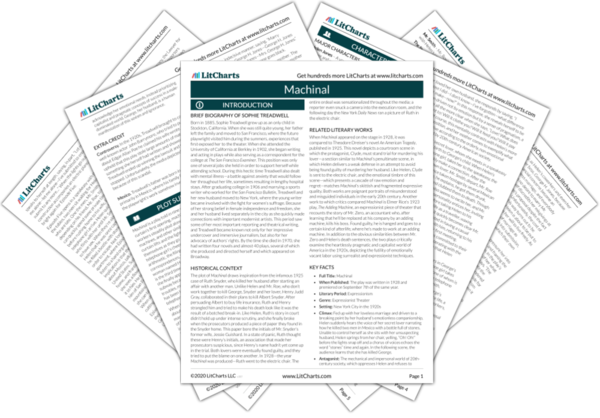Helen Jones
A young woman who initially lives with her mother and works for a wealthy businessman named George H. Jones. Helen is characterized as “soft” and “tender,” a person unfit for the hard “mechanical” world…
read analysis of Helen Jones
George H. Jones
A successful businessman who falls in love with Helen and asks her to marry him. George is a simple man obsessed with making money and prospering in a straightforward, capitalist fashion. Unfortunately, this mindset renders…
read analysis of George H. Jones
Helen’s Mother
An old woman primarily concerned with her daughter’s (Helen’s) wellbeing and financial stability. Because of this preoccupation, she encourages Helen to marry George, who she argues must be a good man because…
read analysis of Helen’s Mother
Mr. Roe
Helen’s secret lover, whom she meets in a speakeasy shortly after giving birth to George’s child. When Helen’s coworker, the telephone girl, takes her to the speakeasy, the two young lovers quickly…
read analysis of Mr. Roe
The Telephone Girl
One of Helen’s coworkers in George’s office. Chipper and young, the unnamed telephone girl takes Helen with her to a speakeasy to meet two men, one of whom is Mr. Roe, the…
read analysis of The Telephone Girl
Get the entire Machinal LitChart as a printable PDF.

The Adding Clerk
One of Helen’s coworkers in George’s office. The unnamed adding clerk is accustomed to office life, a dull and sardonic man who, along with the other office workers, speculates aloud about Helen’s engagement…
read analysis of The Adding Clerk
The Lawyer for Prosecution
The lawyer who cross-examines Helen when she’s on trial for murder. The Lawyer for Prosecution easily unearths the flaws in Helen’s story about the night George died, ultimately triumphing by producing a signed deposition he…
read analysis of The Lawyer for Prosecution
Minor Characters
Mr. Smith
Mr. Roe’s married friend, who is having an affair with Helen’s coworker, the telephone girl.
The Stenographer
A woman Treadwell describes in her notes as the dull adding clerk’s female counterpart. The unnamed stenographer—who works in George’s office—is proper and judgmental, clearly looking down on Helen for arriving late to work.
The Nurse
Helen’s nurse after she gives birth to her and George’s child. Though she wants to help Helen, the nurse fails to recognize that the true source of her patient’s discomfort isn’t any physical ailment, but her lack of agency when it comes to her own life and health.
The Filing Clerk
An immature adolescent boy who works in George’s office with Helen and the rest of her colleagues.
The Doctor
The doctor overseeing Helen’s health after she gives birth.
The Lawyer for Defense
Helen’s lawyer when she’s on trial for murder. Pitching easy questions to Helen, the Lawyer for Defense portrays her relationship with George as idyllic, giving the jury the impression that she had no motive to kill her husband.
The Priest
A priest who reads prayers for Helen before she’s led to the electric chair. He tells her to “trust in God” when she asks if she’ll have “peace” and “rest” in death—two things she’s never had in life.
The Judge
A judge who oversees Helen’s trial.
The Reporters
Three reporters who cover Helen’s trial and who also witness her execution in the electric chair.
The Barbers
Two barbers employed by the prison to shave Helen’s hair in order to ensure her head makes clean contact with the electric chair.
The Jailer
A guard who oversees Helen when she’s in prison.












